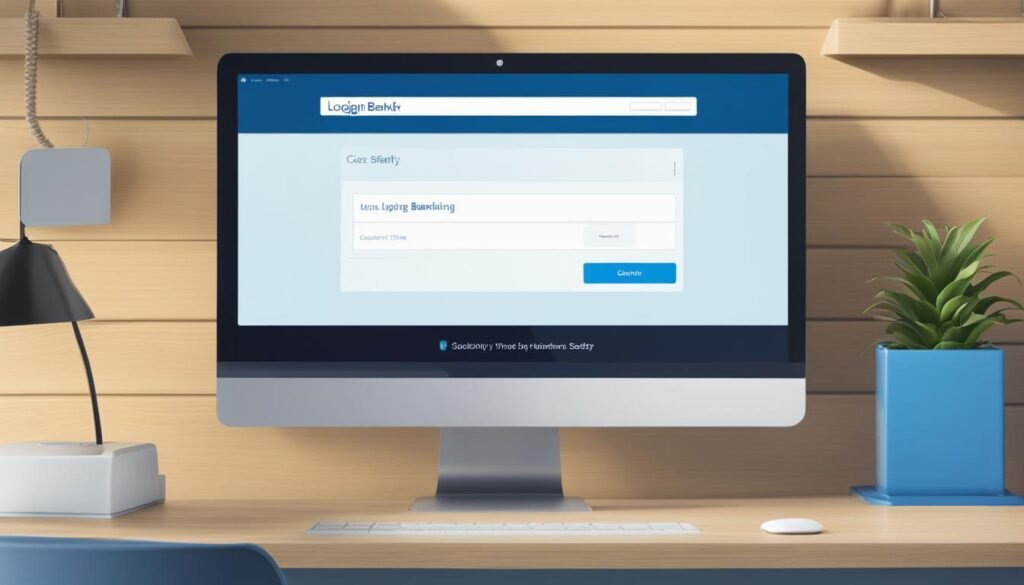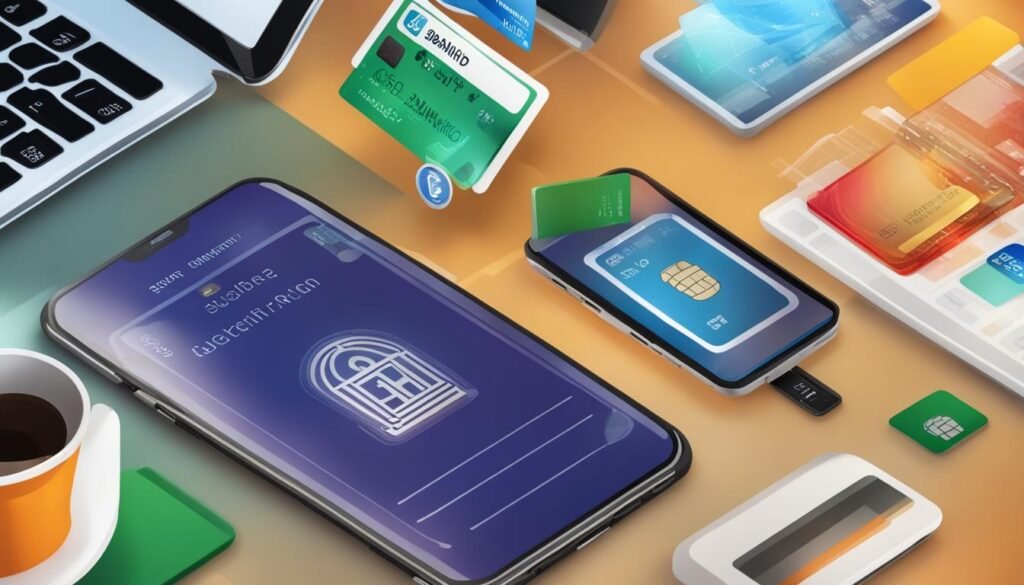Welcome to our article on essential services: setting up internet, banking, and more. In today’s digital age, online services have become a necessity for everyday life. From managing finances to accessing information, the internet has revolutionized the way we live and work. In this article, we will explore the importance of setting up internet services, the benefits of online banking, and how to get started with these essential online services.
Key Takeaways:
- Setting up internet services is crucial for accessing essential online services.
- Online banking offers convenience, security, and cost savings.
- Getting started with online banking requires overcoming initial concerns and following recommended security measures.
- Maintaining security in online banking involves being cautious of fraud schemes and utilizing security features provided by banks.
- Online banking is generally safe as long as users follow recommended security measures and report any suspicious activity.
Advantages of Online Banking
Online banking offers a range of advantages for consumers, making it an essential tool for managing finances. Here are some key benefits:
Convenience and Accessibility
Online banking provides the convenience of conducting transactions anytime, anywhere. With 24/7 access, users can transfer funds, pay bills, and review account balances from the comfort of their homes or while on the go.
Cost Savings
Online banks often offer higher interest rates on savings accounts and reduced fees compared to traditional banks. This can lead to cost savings and maximized returns on your deposits.
Enhanced Security Features
Online banking prioritizes security, offering advanced features such as two-factor authentication and account alerts. These measures help protect against fraudulent activities and provide peace of mind.
Control and Accuracy
With online banking, users have complete control over their finances. They can easily track and manage transactions, ensuring accuracy and eliminating the risk of manual errors.
Valuable Tools
Online banking platforms provide valuable tools to enhance the financial management experience. These tools may include location services, allowing users to find nearby ATMs and branches, and credit score monitoring, enabling them to stay on top of their credit health.
Overall, online banking offers convenience, cost savings, enhanced security, control, and valuable tools to help users effectively manage their finances.
How to Get Started with Online Banking
Getting started with online banking can be a little overwhelming, but rest assured, it’s a secure and convenient way to manage your finances. By following a few simple steps, you’ll be banking online in no time.
- Ensure Strong Security: Before diving into online banking, make sure your devices are secure. Keep your computer or mobile phone updated with the latest security patches and antivirus software. Additionally, only access your accounts through the official website or app of your bank.
- Start with Small Steps: If you’re new to online banking, begin by checking your account balances regularly. This simple task will help you become familiar with the online platform and build confidence. It’s also a good idea to deposit smaller payments, such as checks, to get comfortable with the process.
- Automate Bill Payments: One of the great features of online banking is the ability to set up automatic bill payments. This eliminates the need for manual payments and ensures your bills are paid on time. Setting up direct deposits for your income is also a convenient way to manage your finances.
- Protect Your Account: Online banking security is a top priority. To safeguard your account, choose strong and unique passwords. Avoid using common phrases or easily guessable information. Additionally, consider subscribing to account alerts to receive notifications of any suspicious activity.
Banks understand that the setup process can be overwhelming, especially for those new to online banking. That’s why many institutions offer educational resources and customer support to assist you every step of the way.
“Online banking is a secure and convenient way to manage your finances. By taking small steps and following recommended security measures, you can experience the benefits of online banking with confidence.” – John Smith, Banking Expert

Choosing the Right Internet Service Provider
Before you dive into online banking, it’s essential to have a reliable internet connection. Research and choose a reputable internet service provider (ISP) that offers stable connectivity and fast speeds. This will ensure that you can access your online banking platform without interruptions.
Consider factors such as your location, budget, and the specific internet plans available in your area. Read reviews and compare different providers to make an informed decision. Additionally, check if the ISP offers secure connections such as encrypted Wi-Fi to protect your online activities.
How to Maintain Security in Online Banking
Ensuring the security of your online banking experience is paramount to safeguarding your accounts and personal information. By following some essential security measures, you can enhance the protection of your online banking transactions and maintain peace of mind.
Create Strong and Unique Passwords
Login credentials play a vital role in keeping your online banking accounts secure. It is crucial to choose strong and unique passwords that are difficult for hackers to guess. Avoid using common phrases or easily identifiable information.
“Use a combination of uppercase and lowercase letters, numbers, and special characters to create a strong password.”
Enable Two-Factor Authentication
Two-factor authentication adds an extra layer of security to your online banking login process. By requiring a second verification step, such as inputting a code sent to your mobile device, you can significantly reduce the risk of unauthorized access to your accounts.
Be Cautious with Log-in Credentials
Exercise caution when entering your log-in credentials for online banking. Ensure that you are using a secure and trusted network, preferably your home network, when accessing your accounts. Avoid logging in from public Wi-Fi networks, as they may not be secure.
Stay Informed about Fraud
Keeping yourself informed about the latest fraud schemes and scams is essential for online banking security. Banks often provide educational resources to their customers, offering tips and advice on how to recognize and avoid fraudulent activities.
“By staying vigilant and knowledgeable about fraud and scams, you can better protect yourself from becoming a victim.”
Subscribe to Account Alerts
Account alerts can be an invaluable tool in detecting potential fraudulent activity. By subscribing to account alerts offered by your bank, you will receive notifications of any unusual account activity, allowing you to take immediate action if necessary.
“Account alerts provide an additional layer of security by notifying you of any suspicious transactions or account access.”
By following these security practices, you can help maintain a high level of security in your online banking activities and enjoy a safe banking experience.
Is Online Banking Safe?
When it comes to online banking, one of the most common concerns is safety. However, with the implementation of strict security protocols by banks and the adherence to recommended security measures by users, online banking is generally safe.
Banks utilize various measures to protect customer information, including encryption, secure email messaging, two-factor authentication, and continuous account monitoring. These security features ensure that sensitive data is safeguarded from potential threats.
While banks play a crucial role in maintaining online banking security, users also need to be aware of the risks associated with online banking. Phishing scams and malware attacks are among the potential risks that users may encounter. It is essential to exercise caution when providing personal information in response to emails or texts.
Avoiding the use of public Wi-Fi for online banking is another important step to protect your account. Public Wi-Fi networks can be vulnerable to hacking, and using them for online banking can expose your sensitive information to unauthorized individuals.
Remember, while the convenience of online banking is undeniable, it is important to remain vigilant. Report any suspected fraud immediately to your bank or financial institution to ensure prompt action can be taken to address the situation.
“Online banking is generally secure when banks and customers work together to implement and follow security measures.”
By prioritizing security and being vigilant, users can confidently embrace the advantages of online banking while minimizing the associated risks.
Advantages and Risks of Online Banking
To further explore the advantages and risks of online banking, let’s take a look at the following table:
| Advantages of Online Banking | Risks of Online Banking |
|---|---|
|
|

As seen in the table above, online banking offers various advantages such as convenience, control, and enhanced security. However, it is also important to be aware of the potential risks involved, such as phishing scams and the exposure of personal information.
What is Online Banking?
Online banking, also known as internet banking or web banking, allows customers to conduct financial transactions through the internet. It offers almost every service available in a physical bank branch, including deposits, transfers, and bill payments. Online banking can be accessed through a computer or app, and mobile banking enables transactions on phones or tablets. The services offered vary by institution but generally include basic transactions and some even offer account opening and credit card applications. Online banks operate exclusively online, offering low-cost or free banking and higher savings account yields. They provide customer service through phone, email, or online chat.

Benefits of Online Banking
Online banking provides numerous benefits for individuals looking for convenience, control, security, accuracy, and access to valuable tools. Here are some of the advantages:
| Benefits | Description |
|---|---|
| Convenience | Banking transactions can be performed at any time from the comfort of your own home or on the go. |
| Control | Users have complete control over their finances, with the ability to transfer funds, pay bills, and monitor account balances. |
| Security | Online banking platforms employ advanced security features such as encryption and two-factor authentication to protect customer information. |
| Accuracy | Transactions are recorded accurately, reducing the chances of mistakes compared to traditional banking methods. |
| Tools | Online banking provides access to useful tools such as location services and credit score monitoring to aid in managing finances effectively. |
With the flexibility and benefits it offers, online banking has become an increasingly popular choice for individuals seeking a modern and efficient way to manage their finances.
Benefits of Online Banking
Online banking offers numerous benefits for users. It provides convenience, control, security, accuracy, and access to valuable tools, enhancing the overall banking experience.
Convenience
One of the key benefits of online banking is convenience. Users can perform transactions at any time and from anywhere, eliminating the need to visit a physical bank branch. Whether it’s transferring funds, paying bills, or monitoring account balances, online banking provides a seamless and hassle-free way to manage finances.
Control
With online banking, users have complete control over their finances. They can easily transfer funds between accounts, pay bills with just a few clicks, and set up automatic payments. Online banking also allows users to track their spending and review past transactions, empowering them to make informed financial decisions.
Security
Online banking offers enhanced security features to protect accounts and personal information. Banks invest in encryption technology, secure email messaging, and two-factor authentication to ensure the safety of user data. Additionally, users can easily detect and report any fraudulent activity by reviewing their transactions regularly.
Accuracy
Online banking ensures the accuracy of financial transactions. With online platforms, transactions are recorded instantly and accurately, reducing the chances of errors compared to traditional paper-based banking. Users can review their transaction history in detail, making it easier to identify any discrepancies and resolve them promptly.
Valuable Tools
Online banking provides users with a range of valuable tools to enhance their banking experience. For example, location services help users find nearby ATMs and branches, making it convenient for cash withdrawals or in-person assistance. Additionally, some online banking platforms offer credit score monitoring, allowing users to keep track of their credit health and take necessary actions to improve it.
“Online banking has revolutionized the way people manage their finances. The convenience, control, security, accuracy, and additional tools make it a compelling option for individuals and businesses alike.”
Overall, online banking offers a host of benefits that make it a preferred choice for managing finances. The convenience of performing transactions anytime, anywhere, combined with the control and security it provides, makes online banking a reliable and efficient solution. The accuracy of online banking ensures that financial transactions are recorded correctly, giving users peace of mind. Furthermore, the availability of valuable tools improves the overall banking experience, empowering users to make informed financial decisions.
What do you need for online banking?
To take advantage of online banking services, there are a few essential requirements that you’ll need:
- Internet connection: A reliable internet connection is necessary to access your bank’s online portal or mobile app. Whether it’s Wi-Fi or a cellular data plan, make sure you have a stable internet connection to enjoy seamless online banking.
- Device: You can access online banking through various devices like computers, laptops, smartphones, or tablets. Choose the device that suits your preferences and is compatible with your bank’s online banking platform.
- Bank card: Depending on your bank or financial institution, you may need a bank card, debit card, or credit card to register for online banking. These cards are often linked to your bank account and provide access to your funds for transactions.
- Registering for online banking: To get started, you’ll need to register for online banking with your bank or financial institution. This usually involves providing your account number, routing number, and personal information. Once registered, you’ll create a secure password to access your online banking account.
Meeting these requirements empowers you to enjoy the convenience and flexibility of online banking. It’s a secure and efficient way to manage your finances anytime, anywhere.
Take a look at the following table to get a better overview:
| Requirements for Online Banking |
|---|
| Internet connection |
| Device (computer, mobile phone, tablet) |
| Bank card (debit card, credit card) |
| Registration with bank or financial institution |

Having these requirements in place ensures a smooth and secure online banking experience. Now that you know what you need, you can confidently explore the world of online banking and unlock the convenience it offers.
Conclusion
Online banking has revolutionized the way we manage our finances, providing a fast, convenient, and secure platform for handling various financial transactions. With online banking, users can enjoy a host of benefits, including the ability to complete transactions at their own convenience, whether it’s transferring funds, paying bills, or monitoring account balances. The convenience factor alone makes online banking a game-changer, as it eliminates the need to visit a physical bank branch and allows users to take control of their finances from the comfort of their own homes.
One of the key advantages of online banking is the enhanced security measures it offers. Banks and financial institutions have implemented robust security protocols, including encryption, secure email messaging, two-factor authentication, and continuous account monitoring to protect customer information. However, it’s important for users to remain vigilant and take necessary precautions to safeguard their online banking accounts. By choosing strong and unique passwords, avoiding suspicious links or emails, and enabling account alerts, users can add an additional layer of security to their online banking experience.
Overall, online banking provides a modern and efficient way to manage finances. It offers not only the convenience of completing transactions at any time but also the peace of mind that comes with enhanced security features. Alongside the various benefits, it’s important for users to stay informed about potential risks and actively take steps to protect their accounts and personal information. With online banking, individuals can confidently and securely handle their financial needs from anywhere at any time.






